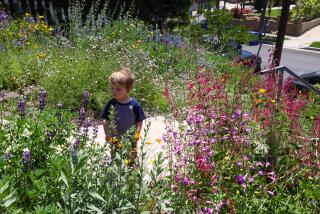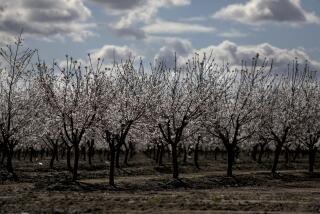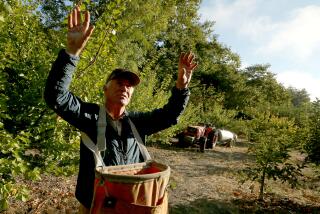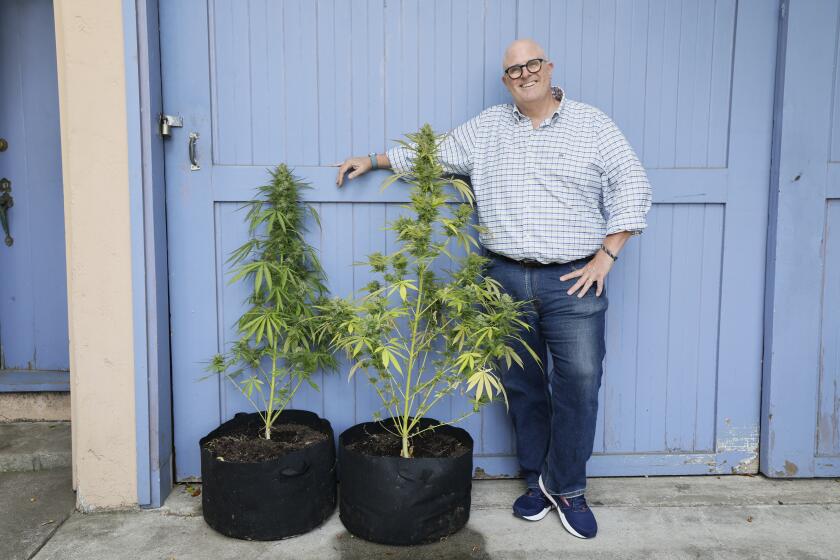Plant Sales Wilt in Drought : Nurseries: Business is down 15% from last year. A few firms have been able to thrive by offering less-thirsty greenery or water audits.
Hugh Palmer remembers when his father bought a small retail nursery in North Hollywood in 1948, back when the area was home to vineyards, a few houses and little else.
But Palmer, who took over the business in 1965, can’t remember a tougher time for the nursery business than today. “People just aren’t buying,” he said.
Palmer won’t disclose his sales volume, but he said his sales fell about 25% last year and are down even more this year.
The reason: The 5-year-old drought and tightened water restrictions by local agencies such as the Los Angeles Department of Water and Power have turned off the faucet on lawns and gardens throughout the region. The DWP’s mandatory water conservation program started in March and requires businesses and residences to reduce water use by 15% from 1986 levels. So far, consumers have cut back by nearly 30%.
As a result, nurseries like Palmer’s have become very lonely places.
Virtually all types of plant-selling businesses are suffering, from small, single-owner operations like Palmer’s to plant and sod wholesalers to large, multi-store retail chains. Overall sales at nurseries, sod farms and tree farms are down 15% statewide from last year, said Mike Kunce, president of Armstrong Garden Centers Inc. and an official of the Sacramento-based trade group Council for a Green Environment.
Kunce said Armstrong, a Glendora-based retail chain with 21 stores, including ones in Glendale, Northridge and North Hollywood, receives about two calls a week from independent nurseries asking if Armstrong would be interested in buying them out.
“Many of them are five months behind in their bills and can’t buy anything,” said Kunce. He said he is sympathetic, but he isn’t biting: Armstrong’s overall sales are down 10%.
“It’s not a happy time for the industry,” Kunce said.
At Palmer’s Nursery, the signs of hard times are evident. Most days lately, Palmer and his two part-time workers see about a dozen customers, compared to as many as a hundred on a busy day in a normal year. Some plants in the nursery have gone unsold for two years and bags of fertilizer have sat untouched for months.
Not surprisingly, Palmer has been cutting back. Roses are his specialty, but he’s reduced the number of rosebushes he keeps on hand from 1,500 to 200. His fruit tree inventory has been halved. Parts of his acre plot are completely empty.
In his tiny hardware shop in the middle of the nursery, Palmer lets his stock run out before he reorders. Even jars of a synthetic substance that is supposed to absorb water and cut the amount of watering needed by 75% haven’t been selling well.
Palmer said lowering his prices wouldn’t help. “I can’t take any more losses than I already have,” he said.
It also does little good to offer so-called drought-resistant plants that require less water, Palmer said. The problem is customers just aren’t coming in at all, he said.
On top of that, Palmer must himself cut back his water use to meet rationing requirements. To save water, he has abandoned his sprinkler system and now waters all plants by hand.
Because he operates only one store and his overhead is low, Palmer said, he will be able to survive even if the drought continues. Nonetheless, it’s made a difference in the way he and his wife live. “We’re not going away on vacation,” he said. “We haven’t been anywhere in the last couple of years.”
At Valley Sod Farm Inc. in Sepulveda, owner Bud vom Cleff said business will probably be off about 25% this year from the usual sales volume of $4 million. He’s down to 21 employees from 35, and is growing sod on only 150 of the 200 acres he leases from the U.S. Army Corps of Engineers.
“I see dead lawns everywhere,” vom Cleff lamented.
Like many others in the plant business, vom Cleff complains that this drought has been particularly damaging to the industry. He said that’s because the DWP is targeting lawns and gardens as areas to cut back water use, whereas during past droughts other ways to conserve water were emphasized. So vom Cleff said he is trying to combat that by teaching customers ways to keep their lawns and gardens while watering less.
Customers entering Valley Sod’s small office are “blasted with literature” filled with water-saving tips, vom Cleff said. He advises customers to plant grasses that require less water, time waterings, water at night or early in the morning and use devices that measure the amount of water in the soil.
The strategy has had only limited success, however, and recently vom Cleff began lowering his prices. His standard variety of sod, Valley Fescue Mix, for instance, is going for 29 cents a square foot instead of the usual 33 cents. “I’ve never discounted like this,” he said. Still, sales remain weak.
There are a few local nurseries that claim to be exceptions to the industry downturn, and say it’s largely because customers are responding to their efforts to sell plants that require less water, as well as other drought-related products and services.
Jeanne Klittich, co-founder of Otto & Sons Wholesale Nursery in Fillmore, said “business has been excellent” because of strong sales to retail nurseries and landscape contractors of hardy plants such as bougainvilleas and junipers.
At Sheriden Gardens Nursery, a retail nursery in Burbank, manager Loren Whitcomb said sales are up 7% this year because customers are tearing out their tropical gardens and replanting them with native varieties such as wild lilacs, rock roses and sages.
Mickey Strauss, president of American Wholesale Nurseries in Canoga Park, which sells to homeowners, developers and public works projects, has turned the drought into a new way to lure business by charging for “water audits”--determining how customers are wasting water and advising them on changes--and installing water-saving drip-irrigation systems and drought-tolerant landscapes. These services have been enough to keep overall sales steady, Strauss said.
Nonetheless, most businesses that rely on things green are hurting, and they say the drought is largely to blame. Bob Cohen, president of Green Scene, a Sun Valley-based sod retailer and landscape contractor, said his sod sales and landscape installations are down about 50%. He has partially compensated for the decline by advising homeowners how to save water. For instance, he suggests ground covers such as ivy and ice plant that can go as long as a month between waterings.
But overall, Green Scene’s sales will be down about 20% this year, Cohen said. With sales off, Cohen isn’t hiring the seasonal help he usually takes on this time of year and “the rent gets paid late,” he said.
Some nursery owners warn that conditions in the industry will worsen in the months ahead. Over the next few months, as temperatures rise, Californians will probably become even stingier with their water, said Mike Connell, manager of Green Thumb Nursery in Canoga Park. “It’s going to be a significant reminder that there’s still a problem,” he said.
And if the drought continues for another year, vom Cleff at Valley Sod worries that after cutting back and trying various ways to boost sales, he’s just about run out of tricks.
“If we go into a sixth year of drought, we could be looking at a traumatic situation,” he said. “I’d probably be thinking about getting out of this.”
Even if rainfall returns to normal levels next year, many in the industry say that a return to typical buying patterns might be slow in coming.
As severe as this drought has been, longtime businessmen like Palmer wonder if Californians have changed their attitudes about plants and gardens for good.
“If we get lots of rain and stop the quotas, I assume people will be gardening again,” Palmer said.
“I also assume that water is going to be tight from here on in.”
More to Read
Inside the business of entertainment
The Wide Shot brings you news, analysis and insights on everything from streaming wars to production — and what it all means for the future.
You may occasionally receive promotional content from the Los Angeles Times.











